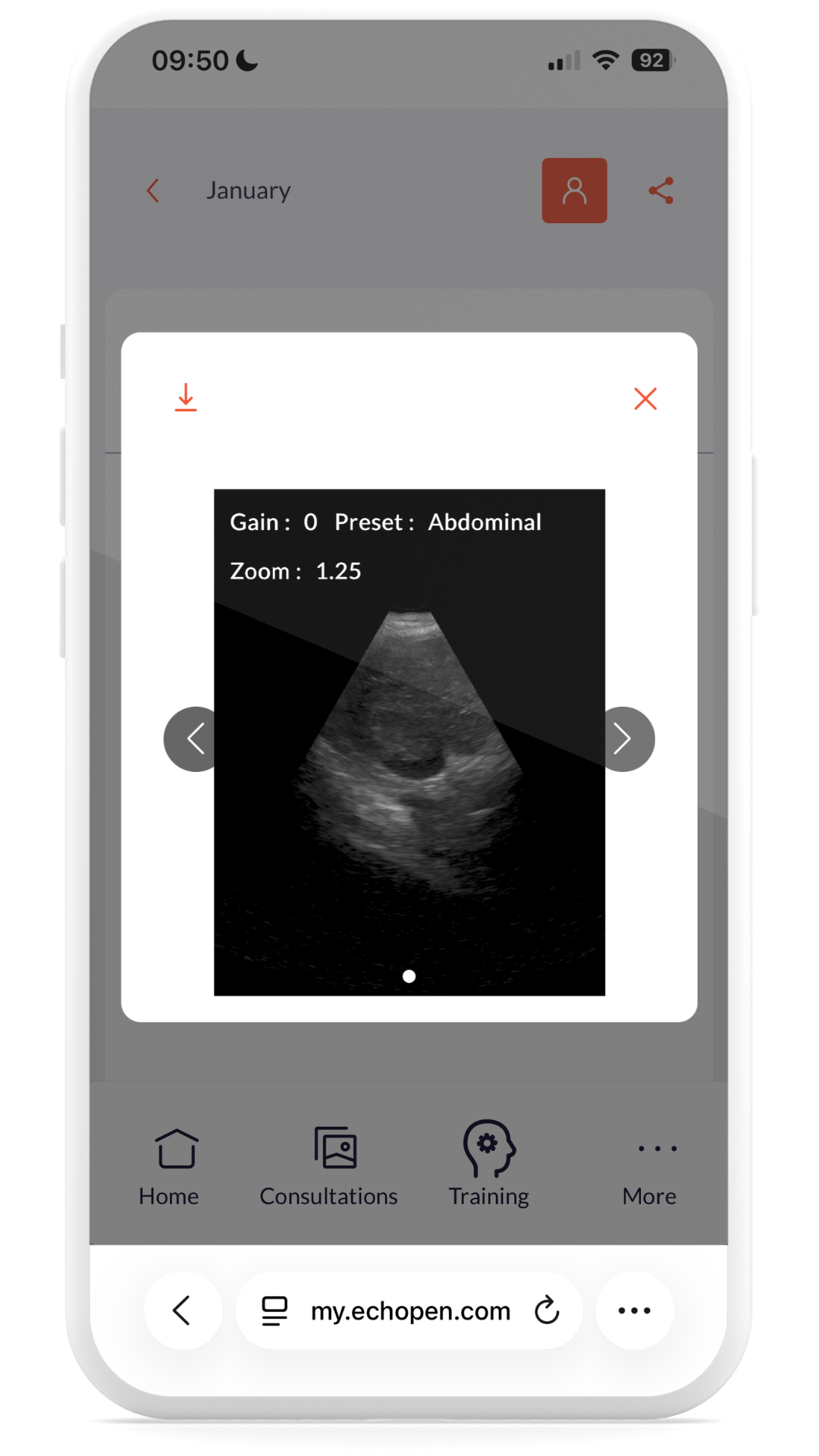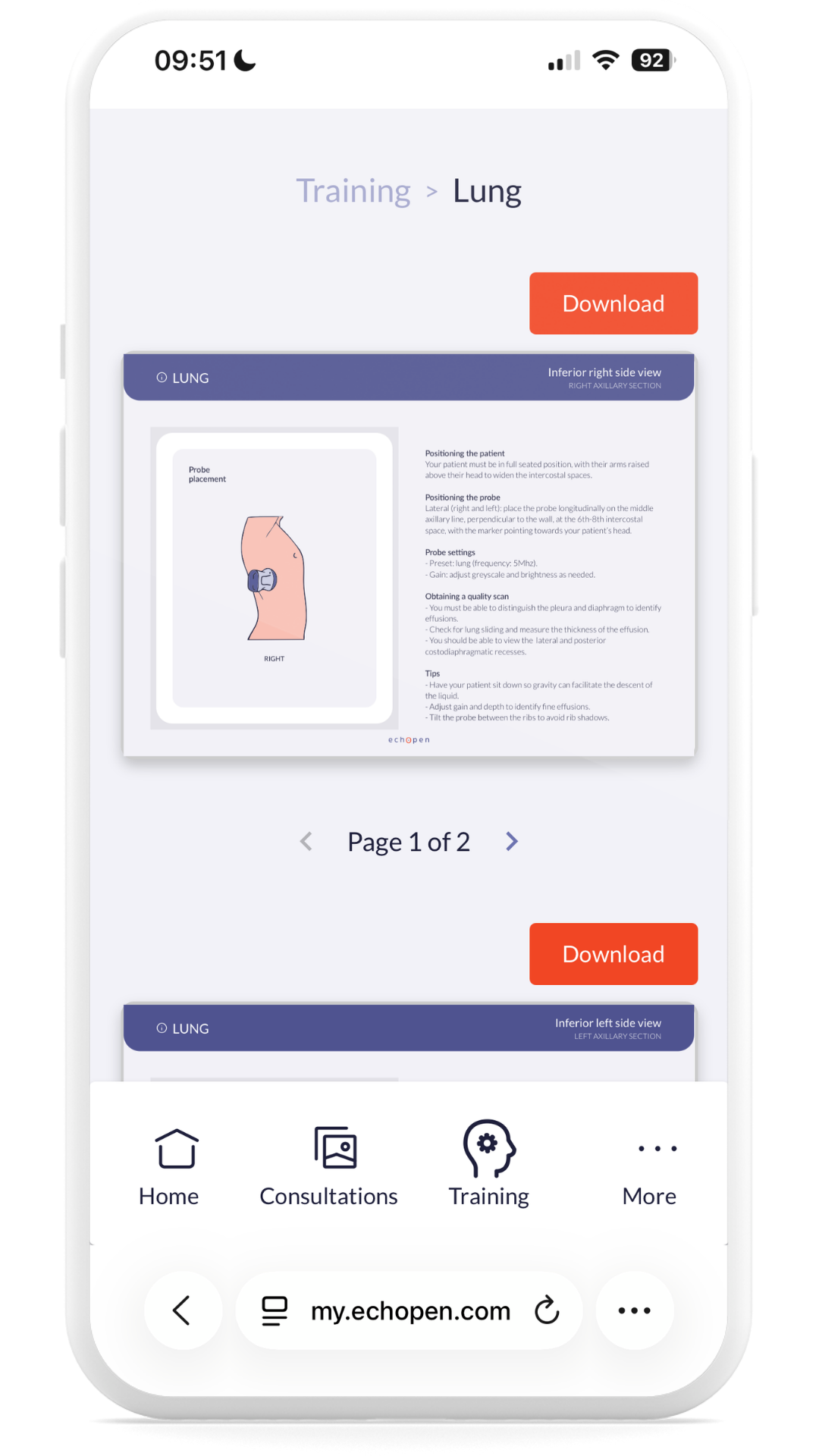echOpen : L'innovation validée par la preuve médicale.
Un socle commun validé par les sociétés savantes (HAS, SFMU, CMG, SPLF) pour voir l’essentiel au lit du patient : masses, épanchements et obstructions.
Né au cœur de l'hôpital
Étude CLIN-ECHO 1
Étude CLIN-ECHO 2
Étude PRESTO
echOpen, l'essentiel de l'echo clinique, développé au sein de l’AP-HP.
Qualité d’image
Validée par 3 études cliniques (AP-HP).

Formation
Accompagnement : vidéos, cas pratiques, articles.
Durabilité
Dispositif stable, calibré sans maintenance pendant cinq ans.

Garanties
Trois niveaux de protection pour une utilisation en toute sérénité.
Évolutive
Sonde et application mises à jour régulièrement, stockage HDS.

Dès 1 578 €
En moyenne 2 fois moins cher que les solutions équivalentes.


1 000+ médecins équipés.
Ils en parlent le mieux.

"Avec echOpen, je suis désormais acteur de la prise en charge étiologique. Je peux avancer dans mon raisonnement clinique, répondre à de nombreuses questions, et gagner en temps et en efficacité. La sonde echOpen correspond exactement à ce que je recherchais : ultra-portable et abordable."

Un échographe portable pour observer les principaux organes

- Anatomie : visualisation des cavités cardiaques
- Diagnostic : épanchement cardiaque et tamponnade
- Étiologies : infectieuses, cardiaques, cancéreuses
- Anatomie : visualisation des culs-de-sac pleuraux
- Diagnostic : épanchements pleuraux
- Étiologies: infectieuses, cardiaques, cancéreuses, maladies pulmonaires interstitielles
- Anatomie : visualisation du foie, rein droit et espace hépatorénal
- Diagnostic : épanchements péritonéaux dans le cadran supérieur de l'abdomen
- Étiologies : hépatiques, traumatiques, infectieuses, affections biliaires
- Anatomie : visualisation de la rate, du rein gauche et de l'espace splénorénal
- Diagnostic : épanchements péritonéaux dans le cadran supérieur gauche
- Étiologies : affections gastro-intestinales, pancréatites, cirrhoses avec ascite
- Anatomie : visualisation de la vessie, de l'utérus et de la prostate
- Diagnostic : épanchements péritonéaux dans la région pelvienne
- Étiologies : maladies gynécologiques ou intestinales, traumatismes pelviens
- Visualisation : gros vaisseaux et vaisseaux périphériques
- Usage: cathétérisme central des gros vaisseaux
- Diagnostic : anévrismes de l'aorte abdominale
- Évaluation en traumatologie
- Protocoles FAST (Focused Assessment with Sonography for Trauma)
- Protocole EFAST (Extended Focused Assessment with Sonography for Trauma)
echOpen : l'échographe portable distingué par le "Nobel de la santé" !
.png)
echOpen s'est vu le 12 décembre 2025 décerner le prestigieux Prix Galien France 2025, dans la catégorie MedTech & Solutions Numériques. Cette haute distinction mondiale valide la vision d'une échographie clinique portable accessible à tous. Notre échographe echOpen O1 est récompensé pour sa capacité à transformer la pratique médicale, en permettant aux soignants un examen enrichi qui réduit les délais de diagnostic et garantit l'équité d'accès à l'imagerie.
2 minutes pour réaliser votre première échographie
Connectez votre échographe à votre smartphone et lancez une consultation.
Lancez l'application echOpen On sur votre smartphone
Connectez-vous à votre sonde echOpen
Démarrez une nouvelle consultation
Choisissez le préréglage adapté
Vous êtes prêt.e !
Enregistrez images et vidéos, retrouvez-les sur votre plateforme à la fin de votre consultation.

my echOpen : la plateforme pédagogique, collaborative et sécurisé
La plateforme vous donne accès à plus de 30 fiches de formation détaillées et à des dizaines d’articles cliniques régulièrement mis à jour.
Staffs d'échographie clinique : progressez à votre rythme. Inclus dans votre abonnement, nos webinaires mensuels vous permettent d'analyser des cas cliniques concrets avec nos médecins formateurs et de soumettre vos propres images. Indisponible le jour J ? Retrouvez l'intégralité des replays à tout moment sur la plateforme my echOpen.
Collaborez avec vos pairs, solliciter des avis, partager des images et votre expertise.
Ces échographies sont stockées en toute sécurité sur un serveur en France aux normes HDS & RGP.



Demandez une démo
Prenez un rendez-vous avec nos experts pour découvrir notre échographe ultra-portable !
Réserver une démo50+ hôpitaux et MSP utilisent echOpen
.png)
Un échographe portable dès 1 578 € !
Un investissement 2x moins cher que le marché pour commencer l’échographie dès aujourd’hui.
Palmarès et distinctions
Les atouts d’un échographe portable pour les praticiens
L’intégration d’un échographe portable au chevet du patient élève l’examen clinique à un nouveau standard.
Véritable échographe de poche, ce dispositif fournit des informations décisives en quelques minutes, redressant près d’un diagnostic sur deux. L’échographe portatif réajuste la stratégie thérapeutique dans plus d’un cas sur quatre. Il limite les orientations inutiles, qu’il s’agisse des urgences ou des consultations en cabinet.
Léger et intuitif, l'échographe portable echOpen se déploie instantanément, sans contrainte logistique, et renforce la confiance diagnostique du praticien. Grâce à cette sonde d’échographie portable tri-fréquence, la visualisation du cœur, des poumons ou de l’abdomen devient accessible à tout moment, garantissant efficience et pertinence dès la première consultation.
FAQ
L'essentiel des réponses sur l'échographe portable echOpen
Quelle est la différence entre un échographe portable et un échographe classique ?
Un échographe portable est compact, mobile et utilisable directement au lit du malade. Il est connecté à un smartphone ou une tablette. Un échographe classique est volumineux, fixe et dédié à un plateau technique. Le portable privilégie la rapidité et l’examen clinique ciblé, le classique l’imagerie experte approfondie.
L’échographe portable est-il fiable pour le diagnostic ?
Oui, pour des indications ciblées. De nombreuses études montrent que l’échographie clinique (POCUS) améliore la précision diagnostique et la prise de décision lorsqu’elle est utilisée par des cliniciens formés, notamment en médecine générale et en urgence.
Quels sont les cas d’usage les plus fréquents ?
Les usages les plus courants sont les échographies abdominales et thoraciques ainsi que les protocoles d’urgence FAST et E-FAST.
Puis-je me former à l’échographie facilement ?
Oui. L’échographie clinique est conçue pour être apprise progressivement, avec des formations courtes, orientées pratique et cas d’usage. Les recommandations internationales soulignent qu’un apprentissage ciblé permet une utilisation fiable dès les premières applications cliniques.
Est-ce compatible avec mon smartphone ?
Oui. Les échographes portables de nouvelle génération se connectent sans fil à un smartphone ou une tablette compatible, qui sert d’écran et d’interface de contrôle. Vous retrouverez la liste des téléphones compatibles ici.
Quels sont les cas auxquels la sonde echOpen ne répond pas ?
La sonde echOpen n’est pas adaptée aux examens nécessitant le Doppler, à l’imagerie musculosquelettique détaillée, ni aux explorations superficielles situées à moins d’un centimètre de profondeur.
.webp)














.jpg)
.jpg)





.jpeg)




.png)



.webp)






